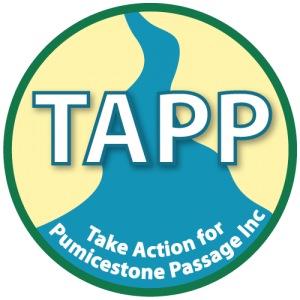Graham Webb, Sunshine Coast Council
Graham Webb grew up in and around waterways – swimming, canoeing and sailing in streams, lakes and coastal waters of North Queensland. He studied Biochemistry and Environmental Science at the University of Queensland, including a postgraduate thesis with the Marine Botany group. He then spent six years monitoring, assessing and reporting on water quality and ecological health of South-East Queensland waterways with the state Environmental Protection Agency. Since then, from 2005, he has been with Sunshine Coast Council, using scientific knowledge, policy and storytelling to help preserve the region’s natural waterways and wetlands for the enjoyment of future generations.
The Pumicestone Passage and its catchment enrich our region, but in the face of continuing population growth and climate change, we can’t take them for granted. Sustained and coordinated efforts are needed to preserve their irreplaceable environmental and social values – including the Ramsar-listed estuary and the threatened marine species and shorebirds it sustains.
For nearly a decade, Sunshine Coast Council, Moreton Bay Regional Council and about thirty partner groups have collaborated to preserve and improve the values of the Passage and its catchment. Our Pumicestone Catchment Network includes representatives from community, industry, agriculture, research and natural resource management groups and state and local government. We hold regular forums to share knowledge and collaborate on projects.
We have planned and coordinated our efforts through implementing catchment action plans. The first plan was for the 2013–2016 period, and we have recently completed a follow-on effort, the Pumicestone Passage Catchment Action Plan 2017-2020. This featured 32 actions by a wide range of organisations to:
improve water quality
enhance aquatic and bushland habitats and biodiversity
increase community and industry benefits and stewardship and
strengthen our knowledge, planning and advocacy.
Outcomes from the Pumicestone Passage Convergence will help us establish priorities for the next action plan, for the 2021–2024 period. This will guide our future collective efforts to meet the emerging and substantial challenges to the health of the Passage and its catchment and the benefits they provide us.
